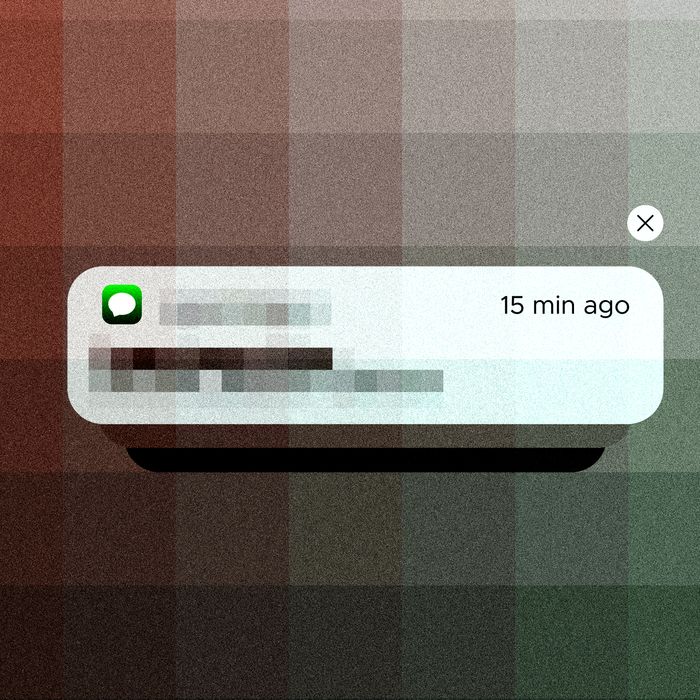
The day that Hamas attacked Israel, Jacob, a Jewish café worker in New York, checked his phone to find his family group chat flooded. His cousin Daniel was stuck in Jerusalem, and the ten relatives in the text thread were concerned. Quickly, the messages took an ugly turn. “Carpet bomb Gaza back to the stone ages,” Daniel fired off. Jacob’s sister shot back: “Thinking this isn’t the group chat to say things like that.” Their dad then sent a separate text to Jacob and his sister, encouraging restraint, but Jacob “wanted to have a clap back,” he says. Emboldened by an espresso martini, he sent Daniel a real knockout: “I’m so happy for you that you’re enjoying your xenophobic defense of a literal apartheid state. But moving forward, I’d appreciate it if you could keep the racist bullshit out of the family group chat. Thank you!! 😘.” Then he turned off his phone for the night.
Since October 7, group chats across the country have transformed into Thanksgiving-dinner nightmares, becoming zones of tension and outright hostility. And no group chats, it seems, have become more terse than those between anti-Zionist Jews and their friends and family members who expect them to defend Israel. Everyone I spoke to said these combative back-and-forths have poisoned those same relationships offline, and all requested anonymity.
For more than 15 years, Leah, a Jewish woman from Canada, has been on a text thread with a small group of high-school friends. They use it to gossip about mutual friends, complain about their hemorrhoids, and share videos of their children. But Leah is anti-Zionist, and the others in the group, who are also Jewish, aren’t. Though for the first week after the attack, the group made a concerted effort to avoid the subject altogether, things went south after the supposed “Global Day of Jihad.’’ On the chat, Leah subtly suggested that her friends were being overly cautious by keeping their kids home from school, and one of the other members responded with a link to an article about a French teacher who was stabbed to death by a Russian Islamist. Then members of the group spotted Leah’s pro-Palestine Instagram posts and things devolved: One friend side-chatted her to say she needed to take space from the friendship; another wrote her to suggest she might just “pretend to love Israel” in order to keep the peace. Things got so unpleasant that Leah decided to bow out of a group trip to Florida, at which point the chat went silent. When Leah wished her friends a good vacation two weeks later, the other three simply hearted the message. “None of them even said ‘thanks,’” she says. And no one has said anything else in there since. As for the friendships themselves: “I don’t really see where they’re going to end up,” she says. Another Jewish, anti-Zionist woman I spoke to said something similar happened in her college group chat after she had a fight with one of the other members about the war. In her case, the chat has continued, except her friend has frozen her out, withholding likes or responses to things as benign as a cat photo.
Other chats have grown so dramatic it’s led to a group exodus. Hannah, a Jewish professor of humanities, uses Facebook messenger to chat with nine people from a nonprofit she co-founded. Though none of them have ever met in person, they text daily. But when one of the members of the group sent a link to unverified news about decapitated babies in Israel, Hannah asked everyone to slow down. “We’re all triggered and the news cycle starts going so fast,” she wrote. Another member of the group replied immediately, accusing Hannah of censorship. And over the next few weeks, whenever Hannah expressed growing concern that U.S. tax dollars were funding a massacre, others accused her of contempt for Israeli life. Several people changed their profile pictures to “I stand with Israel,” while she and a Muslim woman in the group changed theirs in support of a cease-fire. The lines were drawn. Eventually, four people made a simultaneous departure, unfriending Hannah and her co-founders on the way out. A few days later, two more left, but not before writing that it was hurtful to be accused of supporting a genocide. Hannah felt lightheaded. “Part of me feels like I’d be fine never talking to these people again,” she says. “We just worked so hard to build this group. And poof.”
Elsewhere, people have begun using group chats as personal megaphones. A former co-worker told me that out of nowhere, she was added to a text thread by an acquaintance who seemed to want to use the space to criticize pro-Palestinian views. In a block of text, he asked that the members of the chat stop posting on social media solely in support of Gazans, and consider both the Israeli hostages and his family in Israel. The thread — an unwilling audience — was irritated. “I really hated that he was putting everyone on the spot to either agree with him, or disagree with him and look like an asshole,” she says. “It feels more manipulative because it doesn’t feel true to real communication.”
Perhaps these flare-ups were bound to happen. The group chat has always lent itself to a dangerous combination of overthinking and impulse. We’ve all been hit with that dreaded wall of blue text, the product of the sender deliberating every word choice and demanding to be heard. But more often, text threads resemble games, with players one-upping each other’s jokes, bad-day stories, and selfies in exchange for haha’s and hearts. This instinct to showboat is harmless when the stakes are frivolous, but ill-suited to navigating intense feelings brought up by this war. (Or intense feelings in general — ever tried to solve a friend fight in a group chat? Don’t!) “Some people process fast and put out what they think really quickly,” says Hannah. “That voice tends to dominate.” The very phrases necessary to diffuse that emotional conflict — “I hear you,” “That sounds hard,” “I’m sorry” — are anathema to the quippy momentum of a text thread. While compassion is already hard to muster in a conversation about whose humanity matters, it’s especially difficult in a space that thrives on slam dunks and fast responses.
Plus, from behind the protection of a screen, a different side of people can emerge. Jacob, the café worker, is normally conflict-averse. But while arguing on the family group chat, he self-admittedly became a diva. The text thread felt like a cafeteria fight, with all his relatives chanting on the sidelines. I’m going to win this, he remembers thinking. I’m going to fucking Speech and Debate this. “I want to show my good liberal-arts education,” he says. “I wanted to be better than him.”
Since calling out his cousin’s “racist bullshit,” things have only gotten worse. On the text thread he refused to engage with the news sources Daniel was sending, from places like PragerU and TMZ; Daniel called articles from the United Nations and Human Rights Watch “opinion pieces” and told Jacob he was a “self-hating Jew.” When Jacob stopped responding to the group chat out of frustration, his cousin followed him over to Instagram, DM-ing him such questions as “Why won’t Gaza just release the hostages?” “I want to make one thing perfectly clear,” Jacob wrote back. “If you ever call me a self-hating Jew ever again, we will no longer have a relationship.” Then he blocked Daniel.
But after a few weeks had gone by, and he took some time to reflect, Jacob had a little more empathy for the situation. His cousin must have been scared for his life while stranded in a war zone. The group chat was obviously not the best place for such a thorny political discussion, at a time when everyone’s emotions were dialed up. He decided instead to meet in person with his dad, cousin, and aunt, hoping they could connect as family members rather than as political avatars. But this interaction also went horribly. Daniel announced that to preserve their relationship, Jacob would have to stop posting his views on social media, a concession he was not willing to make. The conversation ended in a tense standstill, with Jacob’s only comfort being that unlike over text, he didn’t resort to clapbacks and barbs. “I had prepped myself a whole bunch. You’re not going to be the one who blows up. You’re going to remain calm,” he says. And he did.


